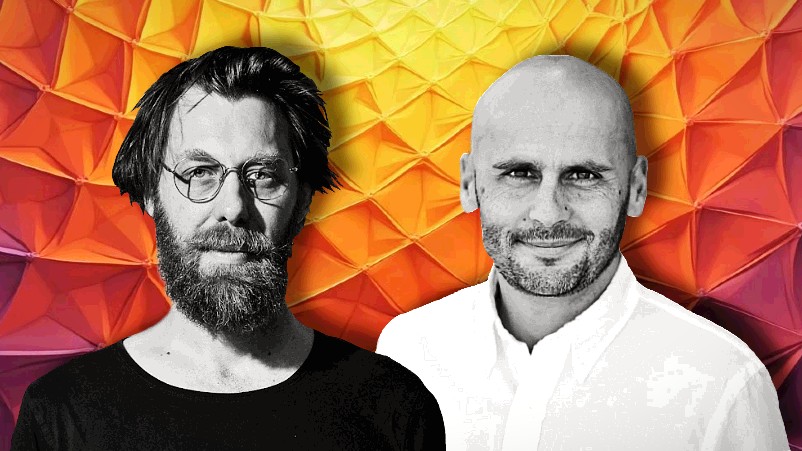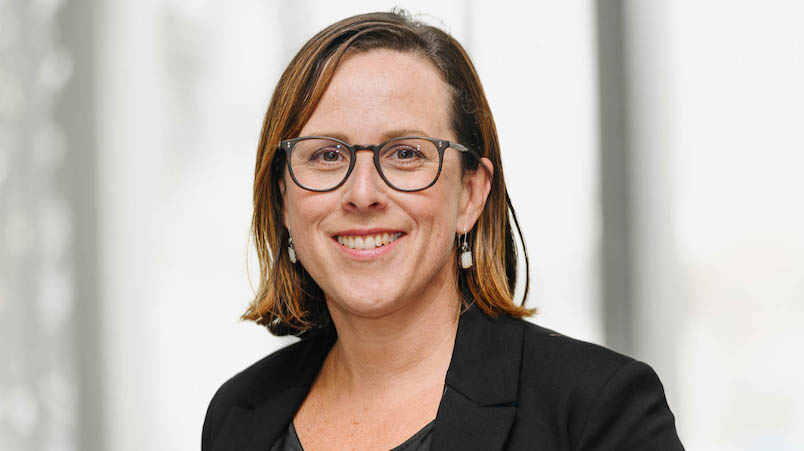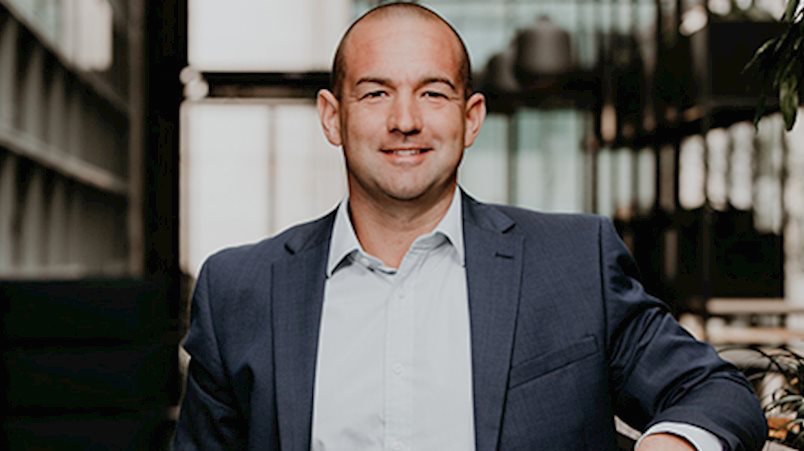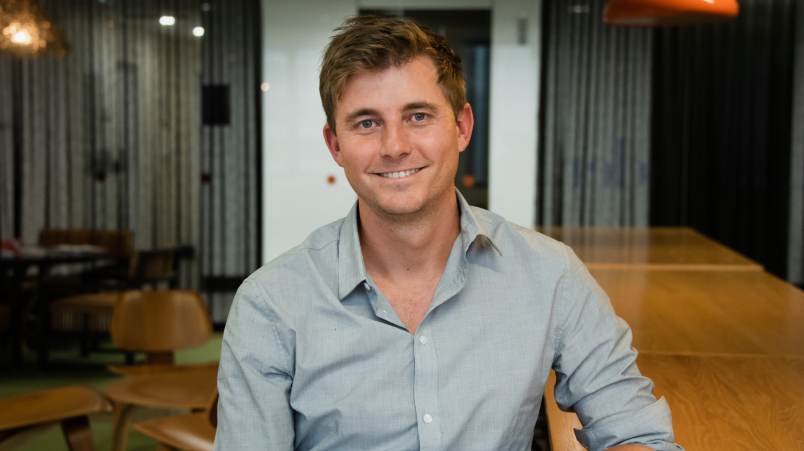WPP’s AKQA lays 12 ‘big bets’ to drive global returns – out of Queenstown, NZ: Apac chief Brian Vella, chief inventor Tim Devine on what next amid flux

Business as usual, but a different usual. AKQA global invention chief Tim Devine (left) and APAC CEO, Brian Vella.
AKQA is making 12 big bets this year, and one joint venture is about to go live from a global innovation hub out of Queenstown New Zealand, helmed by a musician turned coder turned artist turned chief inventor who almost passed up his first job with the firm. Since then Tim Devine has created a platform that helps blind people ‘watch’ live sport that’s going global, body-swapping video calls for Netflix and made Serena Williams play herself in a time-travelling data epic for Nike. Now Devine is tasked with exploring the edges technological possibility to create interfaces and platforms that rapidly pay back big bucks, both for clients and AKQA owner, WPP. Meanwhile APAC CEO Brian Vella sees a major boom in conversational commerce incoming – with retailers scrambling to prepare. Perhaps one reason he says WPP’s sweeping restructure has left AKQA largely untouched locally, so far at least.
What you need to know:
- WPP’s restructure may be gathering pace, but AKQA locally so far has avoided major turbulence, per APAC CEO Brian Vella.
- Now he’s backing a global innovation hub based out of New Zealand and a series of 12 projects over the next 12 months to start generating big returns, often as joint ventures.
- Helmed by global chief inventor Tim Devine, the plan is to use technology that most people haven’t figured out how to work – and then point it at massive datasets to solve problems in new ways.
- Former ACCC chief Rod Sims and The Superpower Institute are a recent beneficiary of that approach, Meanwhile, AKQA’s NZ equivalent to Listnr, Rova, built with MediaWorks for is now bigger than Spotify claims Vella.
- He sees a bow wave of conversational commerce transformation work incoming as agentic AI reshapes interfaces, business models and industries: “It’s going to change everything,” per Vella.
- Devine has already built some “hardcore AI” applications for Netflix and Nike. Now the first of AKQA’s dozen big bets laid in Queenstown is about to land.
- The joint venture “has got legs”, says Devine. He thinks it sets a template for “more return, more value” for the firm “and we’re seeing that return now”.
We got asked to do something the other day which was ten years in the future. From my perspective, that is a waste of money. The client is going to get marginal returns. So kibosh that, lets focus on what we can go now. Because we live ten years into the future now, we just haven’t figured out how to apply all the amazing stuff we have.
Shish happens
AKQA global chief invention officer Tim Devine almost blew out his interview at what was then a Melbourne agency called DT. The agency didn’t actually have the right role for him either. Now he’s tasked with making the WPP-owned unit’s biggest bets globally via a team of inventors out of Queenstown, New Zealand.
Fifteen years ago, Devine had just returned from four years of art school in Europe. He’d wanted to go to the Royal College of Art in London – and made the grade, but it was too expensive. “Tens of thousands of pounds,” says Devine, was a bit steep for a young artist. “So I went to Austria, where it was €500, and it was really, really good.”
He worked and lived in a town called Linz, host to the annual Ars Electronica event, which attracts some highly interesting people, like bio artist Eduardo Kac, Daito Manabe and roboticist and engineer Hiroshi Ishiguru, who literally built an android clone of himself. “It looks exactly like him, and he dresses in the same clothes as the as the robot all time,” says Devine. “I'd be in line for a kebab and Ishiguru would be in front of me. To be able to talk to these people in a small town in Europe was profound for me.”
It inspired Devine to return to Australia to do a PhD in human-computer interaction at Melbourne Uni. “It was all set and I almost didn’t go to the interview for a UX position at DT.”
Devine got the job, but they thought he offered something different. “I met Brian Vella the next day and he offered this role as a ‘creative technologist’.
The rest is history. But now Devine and Vella are tasked with delivering the future, faster – and making it pay for clients and WPP.
It’s business as usual regarding AKQA.
WPP restructure
It’s perhaps telling that while WPP is pressing the trigger on a major global restructure, AKQA is apparently being spared the knife as the holdco places increasing faith – and investment – into AI while accelerating agency brand consolidation in a bid to navigate increasing headwinds.
“It’s business as usual regarding AKQA,” says Vella.
While Grey rolling out of AKQA and into Ogilvy is part of the global shake-up, “that is a shift that will concern the Grey team more than AKQA,” he added. “We’ve been partners, but we never integrated like they did with VML and Wunderman and so many others.”
The Australian arm of Grey Group, WhiteGrey did merged into AKQA last year. “But that was a year ago,” says Vella. “We’re well progressed and working as one business, frankly.”
The first chatbot we made for Hesta we were told to make it not like Microsoft's Tay [which went rogue]. We made it in a Google sheet, I know that sounds really boring, but we made it accessible to Hesta, we saved them $2 million a year and we made it in three weeks. That was the first bot that we'd ever made in the company. We want to do things like that, where we understand … all the reasons why things are not being done and then find smart ways to get around them.
Interface overdrive
Back in 2011, Devine’s original role was to explore the margins out of a physical lab, sometimes soldering things together, sometimes stitching together 360-degree video out of four linked GoPros to create a 3D printed camera in the days before Oculus VR, or a few years later, building a pre-AI chatbot for clients like $68bn super fund Hesta.
Devine uses the Hesta bot example to explain how he thinks AKQA can make its big bets pay off. In short, by enabling new interfaces which exploit the technology available today, but that few people have worked out how to apply.
“The first chatbot we made for Hesta, we were told not to make something like Microsoft Tay, which ended up being racist and all this sort of stuff.
“So we made this thing that was accessible to them [Hesta], because we made it in a Google sheet. I know that sounds really boring, but we made it accessible, and we saved them $2 million a year just by doing this thing. We made it in three weeks, and that was the first bot that we'd ever made in the company,” says Devine.
“We want to do things like that, where we understand … all the reasons why things are not being done and then find smart ways to get around them – while respecting things that we need to respect – so that we can get things into the world that have impact for our clients. It's that simple.”
The point, per Devine, is to invent and rapidly deploy the interfaces that create new experiences, now.
“We got asked to do something the other day which was ten years in the future. From my perspective, that is a waste of money. The client is going to get marginal returns. So kibosh that, lets focus on what we can go now. Because we live ten years into the future now, we just haven’t figured out how to apply all the amazing stuff we have.
“The capability and how we apply what we have access to now is nowhere near being done – which is the opportunity.”
Vella thinks those opportunities are expanding exponentially as agentic AI reshapes entire industries.
“It’s going to change everything. We’ve always said at AKQA that the interface is the brand … and that interface is going to be completely changed by AI. So every brand will have to deal with that moving forward – and it is only going to accelerate.”
Hence AKQA being increasingly choosy about where it places its chips, says Devine.
Bigger bets
“The invention team is focused on bets. Bets are a simple way to understand that we're investing in opportunities, in our clients, for our clients, for our partners. So we've created a way of measuring and prioritising which opportunities we should go after so we've got a better chance of a return on that bet,” he says.
“The way we're going to run it is do 12 bets over the next 12 months – 12 sprints on 12 opportunities with clients, partners, around ideas, technologies, and keep it super simple – it's just about getting out there, getting it done.”
Vella and Devine are keeping their cards close to their chests, but hinted at a joint venture with a US-based partner that could hit pay dirt.
“It’s an exciting digital product, a service, I guess is all I can really say,” per Devine. “But it has got legs and to do joint ventures with partners is a way to create more return, more value from the investments we’ve made over the last ten years – and we're seeing that return now through things like this joint venture, which is a first kind of thing that we're pushing forward … It's building on our IP for sure. But also it's new and it's novel.”Global shuffle
Collecting on smarter innovation bets is what prompted AKQA to create the global chief inventor role for Devine, who some years previously had shifted to become the client-facing executive creative director, which had given him “a bigger reach in the business,” per Vella.
Meanwhile the WhiteGrey integration brought additional creative firepower.
“So now we have [former Google and BMF creative lead] Tara McKenty as our creative leader and ECD. She's brilliant and a different profile to Tim, so now we’ve got the best of both worlds,” says Vella. “Tara's stepped up and is taking the lead in a more traditional agency creative role and Tim's team have got freedom to go back to exploration mode.”
Only this time, it’s global exploration after AKQA had “a bit of a reset globe of our global leadership group” per Vella, to beef-up its tech, strategy and transformation top ranks.
Vella says the global remit is squarely on merit.
“I think that the work that we've produced in Australia and New Zealand, particularly within innovation, has been market-leading and world class. Some of the most remarkable projects that AKQA has had and the most award-winning globally, Tim's been involved in. So it was a great recognition for him to have a bigger platform and be promoted to that leadership group.”
Accumulators paying?
Of those innovation projects, Devine lists Action Audio as a standout.
Developed with Monash University, it brings live sport to life for blind and partially sighted people by creating a 3D audio stream, using reams of real time data to generate sounds that tell visually impaired people what’s going on.
It’s being used by Tennis Australia, Wimbledon, the US Open and is being picked up by basketball and ice hockey codes in the US.
“We’ve just completed a pilot with the NBA and it tested really well,” says Devine.
“It’s opened so many doors, has had a great impact on the world and continues to grow.”
Vella reckons it’s “the most impactful work we have ever done”.
“There are hundreds of millions of people around the world who are blind or with low vision who are otherwise excluded from having that experience … it is game changing and the work is scalable. We’re talking to the National Hockey League, we want to get into surfing. It is a platform, and it can have a huge impact globally – and that is all born out of Tim and his team.”
Devine cites last year’s project with Netflix as another from the top drawer. It was to bring to life the body-swapping premise of the mind bending sci-fi flick It’s What’s Inside, where a machine in a suitcase allows a group of friends to do literally swap bodies – then they have to guess who is actually who.
AKQA replicated the suitcase virtually, so that a group of six friends can do a video call in which their faces and voices are swapped in real time.
“Like working with kids and animals, working with a video call was very challenging, let alone using very hardcore AI for swapping the facial expressions and the voices of people in real time six times on a video. It's a super technical thing, but an awesome experience. It is so fun to talk in someone else’s voice and so weird to hear your voice and see your likeness speaking different things,” says Devine.
“It took that digital avatar experience to another level and fitted so well with the campaign that Netflix wanted for their launch of their film, so I think that was a good one.”
He likewise cites the 2023 Never Done Evolving project with Nike and Serena Williams as one for the highlights reel, where AKQA created a match between the Williams of 1999 and the 2017 version. The work won that year’s Cannes Digital Craft Grand Prix.
“That was a really big project for us … We basically modelled from the time when she won her first grand slam to the last one – and got the two models to play against each other to see how her game had evolved and how she had changed,” says Devine. “What I loved about that project was it made data science accessible to sports fans. We were able to take really intense data science and make every sports fan, surreptitiously, a data scientist... which was cool.”
The Superpower Institute said ‘you’re an agency, you’re too expensive, we can’t pay for you’. I said, ‘well, let’s pitch for some co-funding’. So we did that and we got more than enough money to do a really significant build, which has revealed that methane emissions in Australia are over two and a half times higher than what they are being reported, and from very different sources ... that's the type of that's the type of model we want to replicate.
Supercharging Rod Sims
Closer to home Devine is keen to do more of the kind of projects he’s delivering with The Superpower Institute – a clean economy non-profit (chaired by former ACCC chair Rod Sims) that aims to make Australia a world leader in a post-carbon economy.
AKQA’s been helping it tell the stories hidden within Australia’s climate data.
“We’d done some work with Oxford University around labelling, how to communicate climate science in really simple terms,” says Devine. “Then I came across some work by [Super Power Institute Chief Scientist] Professor Peter Rayner around atmospheric sciences.”
He set up a meeting with what became the Institute to outline how he could help articulate the impact of Australia’s methane emissions. At first it didn’t go too well.
“They said, ‘you’re an agency, you’re too expensive, we can’t pay for you’.” But Devine had a response ready.
“I said, ‘well, let’s pitch for some co-funding’. So we did that and we got more than enough money to do a really significant build, which has revealed that methane emissions in Australia are over two and a half times higher than what they are being reported, and from very different sources,” he says.
“We thought it would have been from agriculture, but it’s actually from fossil fuels … So that's the type of that's the type of model we want to replicate. We were able to do that work for a client that wouldn't otherwise be able to do it. They can't communicate the way we can communicate. We had to understand what the Tropomi satellite does, and its use of infrared spectroscopy – how do we use that to understand where emissions are coming from and how do we make that easy for people to understand why its important?
“Because that can help make the policy, or tell the story for a journalist through a platform, because Professor Peter Rayner can't do that. That's not his skill, and it shouldn't be his skill. His skill is atmospheric sciences. So we've got a really great opportunity to do more of that work.”We're not in the business of going in and trying to help companies take cost out from optimising their businesses. We're about top line growth.
Money talks
In the meantime, Vella says AKQA is increasingly busy with retailers getting to grips with what he sees as the next interface shift: conversational commerce. “It’s only picking up speed and we're working with a number of retailers right now to transform how they present their products and services to their clients and make that accessible.”
He won’t name those clients, but cites “a large company which has a number of retail brands” as particularly active.
While that kind of work puts AKQA increasingly in competition with the big consulting firms, Vella insists its not eyeing their business transformation turf.
“We are very much focused around the customer. We're not in the business of going in and trying to help companies take cost out from optimising their businesses. We're about top line growth.”
On where the firm goes next, he channels Serena Williams. “We continue to evolve.”







